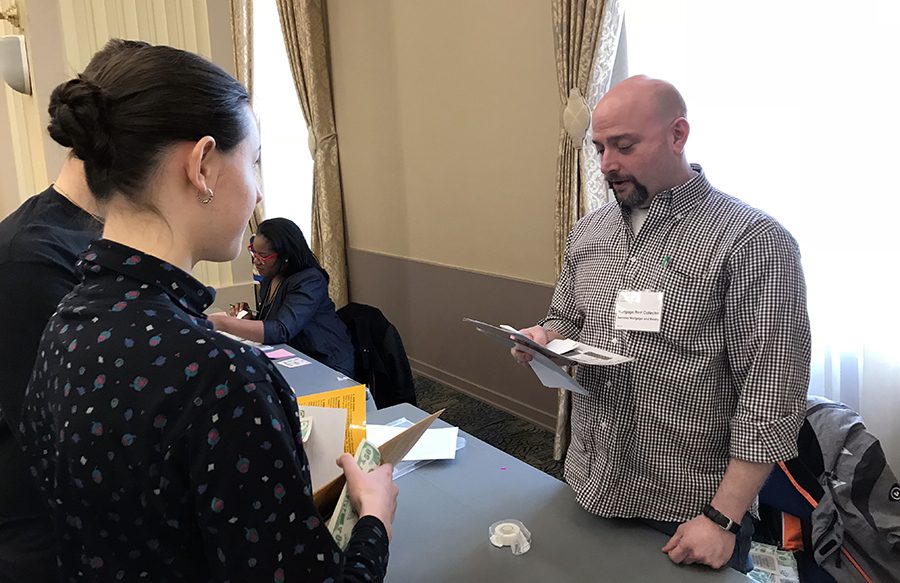Simulation sheds light on poverty in Pittsburgh
January 23, 2018
A poverty simulation was held in the Lawrence Hall Ballroom last Friday from 10 a.m. to 12 p.m. The event, hosted by the Department of Community Engagement, pulled in a crowd of around 50 people – including both university students as well as members of the surrounding community.
Participants in the simulation took on roles that placed them in the shoes of those struggling with the effects of poverty – low-income families, single parents working multiple jobs while caring for their children, children taking on the responsibilities of adults to help their families or senior citizens struggling to live on Social Security as their only income.
Tammy Thompson, consultant for Circles of Greater Pittsburgh – a national nonprofit dedicated to helping communities fight poverty – facilitated the event.
“This is a way to take on a perspective that is not our own, a way to learn about each other and increase empathy toward those living in poverty,” Thompson said in an interview following the event. “This is a large scale address to major problems that keep people in the cycle of poverty.”
Circles of Greater Pittsburgh, Point Park’s Department of Community Engagement, the Honors Program, Center of Media Innovation, School of Communication, Center for Inclusive Excellence, Student Affairs and the Department of Psychology were all listed as sponsors for the event – drawing in a diverse crowd of participants.
Kelsea Enriquez, a 21-year-old Greenfield resident, heard about the event from her roommate and decided to attend because she has been personally affected by the struggles of living from paycheck to paycheck.
“I’m living it, living the simulation,” Enriquez said in an interview following the event. “I started getting teared up because it hit home for me. There is such a disconnect between what some people think is happening and what is really happening.”
One of the goals of Circles is to raise awareness within communities to those that may not immediately be affected by the tight grip of poverty, by connecting low-income participants with higher-income community members. Financial council and professional connections act as more than just a band-aid, but a long-term solution that ends the continuous cycle of poverty, according to Jodi Salant of the East Liberty Circles location.
“We are in a system that keeps people in situations where they can not grow,” Salant said in an interview following the event. “Getting involved with Circles has taught me a lot about the cliff effects of poverty; if people have an increase in their income, but lose a benefit like childcare that they then have to cover themselves, a net loss is the result.”
People stuck in the endless loop of poverty aren’t that hard to find in Pittsburgh communities. Nearly one in four Pittsburghers live below the poverty line, $24,250 a year for a family of four. The poverty rate in many neighborhoods within the city is hovering around 30 percent, bringing the grand total of those living in poverty at the time of this publication to 69,120, according to Circles.
Kendra Ross, a doctoral candidate in the Community Engagement department, helped bring this event to Point Park with department chair and professor Dr. Heather Starr Fiedler. A member of the artist community, Ross has a long-term goal for achieving an ideal Pittsburgh.
“I want to make sure Pittsburgh is a livable city for everyone,” Ross said in a phone interview on Monday. “The city needs to be an inclusive and vibrant place for all of its citizens, not just a select group.”
Starr Fiedler expressed the need for Point Park to host an event targeting poverty. because it’s an issue plaguing more students here than on any other Pittsburgh campus.
“In a recent survey, we discovered that Point Park students have the highest rate of food insecurity,” Starr Fiedler said in an interview last Tuesday. “We are trying to take a deeper look at the systematic cause of these issues – if we fix the roots, we won’t keep tripping and falling.”
As for those that attended who are struggling themselves, the simulation provided a helpful look into resources available that might ease the economic mountain they are toiling to climb.
“Helping each other and building that support system is important to give the strength to keep going,” Enriquez said.
Thompson highlighted the need for people of all economic backgrounds to lend a hand to build a better community for all.
“Some say that you need to pull yourself up by the bootstraps, but some people don’t even have boots and that’s not fair,” Thompson said. “We want you to be fired up to do something to help – if you leave here today and don’t feel compelled to do something, shame on you.”


















